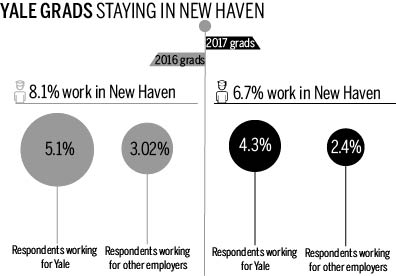
Every year, dozens of Yalies begin their postgraduate lives working in the Elm City. But those students are in the minority.
According to the Yale Office of Career Strategy’s First Destination Survey, which tracks where Yale students work after graduation, only 8 percent of the Class of 2016 began working in New Haven after graduation. Five percent of respondents said they were employed by Yale, and 3 percent said they were working elsewhere in New Haven. The survey had a response rate of 92.3 percent.
A preliminary First Destination Survey on the Class of 2017, which has an 83 percent response rate so far, showed that 6.7 percent of graduates are working in New Haven, with only 2.4 percent working for New Haven employers other than Yale.
Jeanine Dames, director of the Office of Career Strategy, said these numbers have remained fairly consistent since 2013, when Yale began collecting the data.
“An understandable reason for some Yale students to not work or live in New Haven is the fact that they went to school here for four years and want to explore other cities,” said Abdul-Razak Zachariah ’17, who works as a grant writer at LEAP, a New Haven organization that provides after school and summer opportunities for underprivileged youth.
“A more frustrating reason is that some Yale students have limited their entire view of New Haven to their experiences from Chapel Street and Science Hill,” Zachariah said. “Yale students who call New Haven boring, unsafe or a poor place to start a career have not actually explored the communities and met the residents that bring life to the city that they have unwittingly lived in for four years.”
Zachariah said that while LEAP offers opportunities for Yale students to work as senior counselors, an average of only one or two Yale students work there each year, compared to the more than 50 students from other New Haven colleges and universities.
As an undergraduate, he said, he did not fully act engage with the city; however, as graduation neared, he said, he recognized that New Haven could teach him how to be a better community member and service provider and a more empathetic person.
Caroline Smith ’14, co-director of the early-entrepreneur support organization Collab New Haven, said that before living in New Haven, she had never felt like a part of the city. But after falling in love with a New Haven resident, she said, she got to see the city through her partner’s eyes, exploring bars and rooftops and forging a community of friends outside Yale.
Dames said the most frequent New Haven employers of Yale graduate include Achievement First, the Addiction Prevent Treatment Foundation, the Connecticut Center for Arts and Technology and the New Haven Land Trust, among other nonprofit organizations and self-made startups. At Yale, the Yale College Admissions Office, the Woodbridge Fellows Program, Yale-China Association and the Medical School provide frequent jobs routes for new grads.
Yale spokesman Tom Conroy said that because Yale is New Haven’s largest employer, he was not surprised that most students working in New Haven postgraduation choose to work at the University.
Leah Salovey ’17 — a Woodbridge Fellow, communications worker for the FAS Dean’s Office and the niece of University President Peter Salovey — said one of the reasons she chose to work at Yale was because of New Haven’s affordability in comparison to New York. Instead of spending all her income on rent, she can explore the “active downtown with great food and nightlife and culture,” and take advantage of Yale’s opportunities despite having graduated, she said.
Dianne Lake ’16, another Woodbridge Fellow, took a gap year in New Haven to work for the Office of International Affairs as part of her plan to attend Yale Law School.
“I wanted to work somewhere that I would be comfortable and have a support network so I could spend my extra energy on the LSAT and my law school applications instead of on adjusting to a new city and new environment,” Lake said.
But not everyone wants a familiar environment, especially those who fear that working in New Haven will feel too much like college, said Salovey, hypothesizing why some graduates may seek jobs elsewhere.
The past two years, the Office of Career Strategy has worked to improve New Haven employer outreach, by including city organizations in job recruitment events, Dames said. She added that this fall an additional section to the weekly newsletter, sent to all Yale College students, advertised job opportunities in New Haven.
“I felt so lucky to be able to stay in New Haven after graduation,” Smith said. “The number one thing we should invest in to improve the Yale-New Haven relationship is in creating more inclusive spaces where Yale and New Haven residents can become friends, build power together, fall in love even.”
In the 2015 to 2016 academic year, the Office of Career Strategy offered more than 420 Yale-coordinated international and domestic internships to students.
Kiddest Sinke | kiddest.sinke@yale.edu







